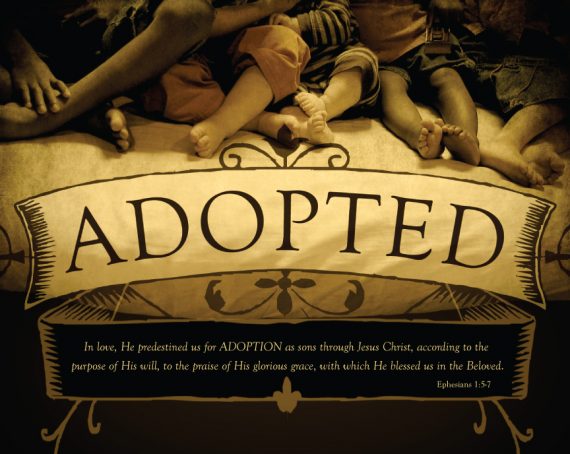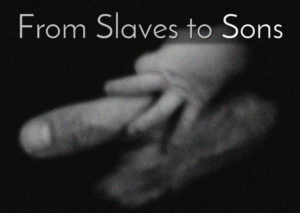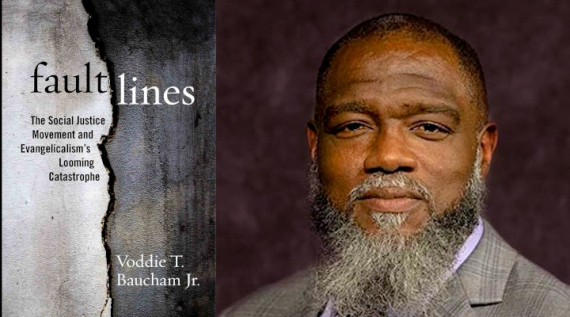Do you know what it means to be adopted? Of course you do. We all know people who have adopted children. Maybe you have adopted a child, or maybe you yourself are adopted. But did you know what the modern form of adoption has almost no similarities with adoption in biblical times? If we don’t know how adoption worked in Bible times, we will misread and misunderstand Scripture. This study on Ephesians 1:5-6 explains how adoption worked 2000 years ago, so that we can better understand Ephesians 1:5-6.

But before we look at Ephesians 1:5-6, we will look at a current event and answer a question from a reader.
Current Event: The Fault Lines in Critical Race Theory
Critical Race Theory (CRT) and the Social Justice (SJ) movement are causing intense damage to the world, and to Christianity. Those who hold to CRT and SJ say they are trying to bring an end to racism, but their ideas actually do the exact opposite. And sadly, many Christians are falling prey to the ideas of CRT and SJ, which destroys the peace-bringing message of the gospel.
If you don’t know what Critical Race Theory is, or why it is so destructive to the gospel, I highly encourage you to read (#AmazonAdLink) FaultLines, the new book by Voddie Baucham Jr. It’s currently a best seller in numerous categories and is on the USA Today Bestseller list, but if you search Amazon for “Faultline,” it won’t show up on the first 10 pages of search results because Amazon and the proponents of CRT are trying to silence the information that Dr. Baucham includes in his book. So you can click the link above or search Amazon for “Faultlines by Voddie Baucham.”
The book is so important, I’m going to use the “Current Events” section of the next couple podcasts to talk about it.
Dr. Baucham begins the book by defining the key characteristics of Critical Race Theory. He points out that CRT is based on the theories of Karl Marx and class warfare (p. xii). So at it’s root, CRT is a form of Marxism. And Marxism has killed more people in the history of the world than any other political perspective. Marxism is inherently violent.
Due to this, proponents of Critical Race Theory are not interested in reforming culture and society. They want a revolution (p. xiii). This is why they are not interested in reforming the police. They want to defund the police.
The reason proponents of CRT want a revolution is because they believe that society is inherently racist … or is systemically racist … and so it cannot be fixed or redeemed; it must be destroyed. According to CRT, everything is based on white privilege and white supremacy (p. xv), including politics, education, economics, and business. So it all must be torn down. They even claim that things like logic and math are inherently racist. They say that minorities don’t primarily use logic and reason to make decisions and gain knowledge, but instead use stories, emotions, and experience (p. xvi-xvii). Therefore, any structure or society which is based on the sciences (which depend on logic and reason) is inherently racist because it favors white people.
This is why, by the way, if you ever try to use logical arguments and reason against Critical Race Theory, you get accused of being a racist, because logic is racist.
Now, a lot more could be said to explain CRT, and Dr. Baucham does in his book. But here is why Critical Race Theory is so destructive to society in general and to the gospel of Jesus Christ. According to numerous texts in the Bible, one of the things Jesus came to do was to tear down and destroy the divisions between the races. Proponents of CRT want to do the same thing, so that’s good. But proponents of CRT go about trying to destroy racism in exactly the opposite way as Jesus. As we will see when we study Ephesians 2, Jesus brought healing and reconciliation through forgiveness and grace. He killed the hostility between races, not by requiring others to die for Him, but by dying for the others.
The gospel does not call everyone to act the same and think the same, but rather to celebrate and enjoy our differences, because our differences are exactly how God made us to be. And where we are hurt or wronged, we are not to seek vengeance, retaliation, or the destruction of others, but instead are to love and forgive. If justice can be achieved, this is the only way to do it.
Dr. Baucham is extremely concerned about racism and justice. I am too. All Christians who truly follow Jesus want to see peace and reconciliation. But Critical Race Theory accomplishes nothing of the sort. If you want to learn more about this, I highly recommend you read (#AmazonAdLink) FaultLines: The Social Justice Movement and Evangelicalism’s Looming Crisis by Voddie Baucham, Jr.
I will discuss his book a bit more in future podcasts.
Letter from a Listener
I received this email from Michael Spina:
Hi Jeremy! I’ve been a member of your Redeeming God website and absolutely love everything you teach. I love your courses and books because I can tell you’re very practical and truthful to what you say. Your judgements are very sound and don’t favor any extreme views. It’s people like you who I seek out for assurance that I’m on the right track. In my personal opinion, your take on the Gospel is the most clearest and convicting, and is the most comparable to that of the Apostle Paul. I hope you’re encouraged by that.
Now I do have a theological question. It is the story of Ananias and Sapphira in Acts. I’m sure you know the story. Did they commit the unforgivable sin? Because if not, why did they die? Why not be given the chance to repent?
Thanks for the encouraging email. That’s a great question!
I have struggled with this very question quite a bit, and plan to try to address it in a future book.
Here are my “notes” on this text … which are only theories at this point … sort of “leads” for me to follow when I get around to studying the passage in more detail:
—————————

First, it is important to note that the text does not say God killed them. But this is the way it is often preached. All it says is that they fell down and died. Something very strange is going on here.
Note as well the result of these actions: Great fear fell upon all. Fear? If this was God’s actions, how could fear be the result?
One way to read the book of Acts is to see it has the two themes of “Filled with fear vs. filled with the Holy Spirit” or maybe we could say “Law vs. Love.” Acts shows a series of mistakes (based on the law resulting in fear) mixed with a series of miracles (based on the Holy Spirit resulting in love, joy, wonder, amazement, and awe). Luke tells us which it is by how he summarizes the response of the people. But in this case, great fear fell up on the people (Acts 5:5, 11) which hints that the Holy Spirit had nothing to do with these events.
But there is more. If crime scene investigators looked into these deaths, Peter would be the prime suspect. Peter had a violent streak, and his violence was always “justified” by blaming it on God. In the Garden of Gethsemane, he tried to protect Jesus by attempting to behead Malchus, the servant of the High Priest. But Peter only got an ear, which Jesus then healed.
Has Peter changed? Well, he is changing, but he has not yet fully changed. He is zealous for God and for the law. He still thinks some Jews and Gentiles are outside of God’s grace (cf. Acts 10 and Galatians 1). Then there are Peter’s words in Acts 5. Can a man lie to God? No. Despite what Peter says in Acts 5, the lie was directed at man (and specifically Peter); not at God.
What am I saying? Though it cannot be proven, the evidence leads one to believe that Peter had more to do with the death of Ananias and Sapphira than did God. Luke might have hinted at the use of poison when he noted that both Ananias and Sapphira fell down and breathed their last.
This is a very difficult text, so we must be careful to hold our conclusions lightly. One thing is for sure though … God did not kill Ananias and Sapphira, and He does not kill people today, no matter how greedy or deceptive they are. And no matter what, they did not commit the unforgivable sin, and we can be sure to see both of them in eternity with the rest of the saints.
What is the Adoption as Sons in Ephesians 1:5-6?
In previous studies we have learned that election is not to eternal life, but to service, and the predestination is similar; it also is not to eternal life but is God’s predetermined plan about what He will do for believers. The theme of adoption in Ephesians 1:5-6 wraps these twin ideas together. If you are part of my discipleship group, you have access to an entire lesson on adoption in the Gospel Dictionary Online Course.
 In Ephesians 1:5, Paul writes that God predestined us to be adopted as his sons.
In Ephesians 1:5, Paul writes that God predestined us to be adopted as his sons.
Now, most people think of adoption the way adoption occurs today.
In the modern concept of adoption, only orphans are adopted. No one ever adopts their own children. But at the time of Paul, adoption was something altogether different.
In the Roman world, fathers had what was known as patria potestas, or the father’s power. It meant that a father had absolute power over his children as long as he lived and as long as they lived. If he was in financial need, he could sell his children into slavery. If he was angered by his children, he could legally kill them, imprison them, or make them his slaves. The father maintained this right even when his son became old enough to have a family of his own, even if the son held political office, and even if he was honored by all men. There are instances in Roman history of all of these things happening.[4]
It was also Roman law that a child could never possess anything, no matter how old they became. If you were a father, and your son was the age of 30 years old, and became very rich, all that the son owned was considered to be the property of the father until the father died.
It is also true that most fathers had many children by many different women. They were not polygamists; for the most part, they only had one wife. But many households also had slave women with whom the father often conceived children. These children were his children, they were not orphans, but—and this is the key—they were not heirs.
So imagine the scene. A father could have multiple sons. He could have multiple sons by his wife, and he could have multiple sons by slave women. By default, the oldest son of the wife was considered the heir. But if the father didn’t like the oldest son, and he liked a younger son of his wife, or even a son of one of the slave women, the father could adopt one of his own sons as his heir, thereby disinheriting the eldest son. It was even a common practice for a father to adopt the son of some other family as his heir. This was a way to form alliance between rich and powerful families.
One of the most famous examples of Roman adoption is when Julius Caesar named his grand-nephew, Octavian (who became Caesar Augustus), to be his heir. Some believe Julius Caesar already had a biological son with Cleopatra, named Caesarion, but who was never named as Caesar’s heir. But Caesar Augustus was not the only one who was adopted this way. Almost every Roman family used adoption as a way to create political ties with other rich and powerful Roman families. During the Roman Empire’s first 200 years, this adoption tradition became quite common, with Tiberius, Caligula, Nero, Trajan, Hadrian, Antoninus Pius, Marcus Aurelius, and Lucius Verus all becoming Emperor through adoption.
So in biblical times, adoption had nothing to do with welcoming an orphan into your family and making them your son or daughter. Instead, it was a way to declare one of your sons as an heir, or even the son of someone else as your heir. It had nothing to do with becoming a son in the family, and everything to do with being named the heir of the family wealth, power, and position. The adopt a son was to legally give them the right to the family inheritance. The legal ceremony of adoption was quite impressive and it gave the adopted the child the title of “heir.”
 Paul, of course, was a Roman citizen, and the letters in which he mentions adoption were written to other Roman citizens, so it makes sense that Paul’s language about adoption matches the way it was practiced in Roman culture at that time.
Paul, of course, was a Roman citizen, and the letters in which he mentions adoption were written to other Roman citizens, so it makes sense that Paul’s language about adoption matches the way it was practiced in Roman culture at that time.
So when Paul says that God has predestined us to be adopted as sons, he is saying that God promises to make us His heirs. As long as the child remained unadopted, he was considered to be slave, even though he was a child born of the Father.
Again, Paul talks about this exact idea over in Galatians 4:7: “So you are no longer a slave, but a son; and since you are a son, God has made you also an heir.”
We are sons by birth when we placed faith in Jesus Christ, yet, though sons, it is as if we were still slaves. But because of our Father’s great love for us, He has decided that He will adopt us as heirs. We get into God’s family by regeneration—or the new birth, but we become heirs of God through adoption. And while we are adopted now, we don’t receive the full inheritance of our adoption until we enter into the eternal kingdom after death.
 That is what Paul says God is promising to us here. God has named us heirs. We are heirs of God and co-heirs with Jesus Christ. This promise of predestination is not about God deciding who gets to heaven and who goes to hell; it is about God decided that rather than just one son getting all of His inheritance, all of His children get to share in the inheritance of His family. What a wonderful promise and blessing for His children!
That is what Paul says God is promising to us here. God has named us heirs. We are heirs of God and co-heirs with Jesus Christ. This promise of predestination is not about God deciding who gets to heaven and who goes to hell; it is about God decided that rather than just one son getting all of His inheritance, all of His children get to share in the inheritance of His family. What a wonderful promise and blessing for His children!
3. Reasons for Predestination (Ephesians 1:5b-6)
The rest of Ephesians 1:5 and on into Ephesians 1:6 tells us why God has decided to do this for us. We see it is because it pleases him. God does this out of His good pleasure.
We see next he wants to adopts us because it is his will to do so. It is not our will. Romans 9:16 tells us that these things are not because of man’s will, man’s desire or man’s effort. It is all due to God’s will and God’s mercy.
In Ephesians 1:6, we see that God does this because it will be to the praise of his glorious grace. Everything that God does, He does for His own glory and for His own praise. And here, it is all because of his grace.
This grace is not earned, it is not merited, it is not worked for. This grace is freely given us in the One he loves. It is freely given. There are no strings attached to this gift. It is freely given. It is not something we worked for, or else it would be given to us as pay.
If you remember back to Ephesians 1:3, Paul wrote that he was going to tell us about all the riches and blessings we have in Jesus Christ. This theme of blessings and riches dominates the first three chapters of Ephesians, but so far, in Ephesians 1:4-6, we have already seen several of these blessings.
- We have been chosen (elected) to be on God’s team for His plans and purposes in this world (Ephesians 1:4)
- We have been predestined so that no matter what, we will be glorified with God in eternity (Ephesians 1:5a)
- We have been adopted into God’s family so that we have all the rights and privileges of ruling with Him (Ephesians 1:5b)
- And in all three, He has poured out His love and grace upon us, both of which are infinite and free (Ephesians 1:4, 6).
What blessing will Paul talk about next? We will see when we consider Ephesians 1:7 next time.





Leave a Comment or Question